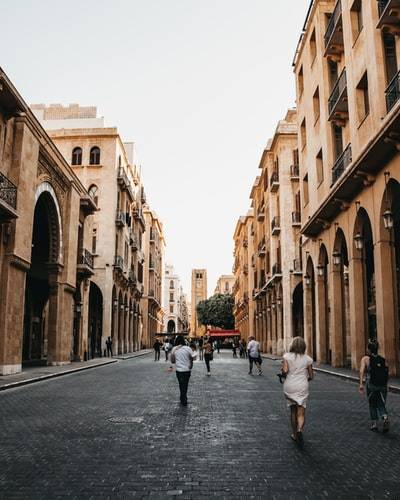Under the title "Lebanon Drowns Toward One of the Most Severe Global Crises Amid Deliberate Inaction," the World Bank published a report indicating that Lebanon is suffering from a severe and chronic economic recession. According to the Lebanon Economic Monitor report released today by the World Bank, this economic and financial crisis is likely to be classified among the ten most severe crises, and possibly one of the three most severe crises worldwide since the mid-19th century. In the face of these immense challenges, the ongoing inaction in implementing rescue policies, due to the absence of an executive authority performing its functions fully, threatens the already deteriorating social and economic conditions and the fragile social peace; and there is no clear turning point on the horizon.
The Spring 2021 issue of the report titled "Lebanon Drowns: Towards the Worst 3 Global Crises" presents recent economic developments in Lebanon and examines the economic outlook and potential risks the country may face. Lebanon has been facing escalating challenges for more than a year and a half: the largest economic and financial crisis in peacetime, the COVID-19 pandemic, and the Beirut port explosion. As noted by the Lebanon Economic Monitor report, the Lebanese authorities' response to these challenges regarding public policies has been largely insufficient. This deficiency is not due to gaps in knowledge and good counsel, but rather to: (1) the absence of political consensus on effective policy initiatives; and (2) the existence of political agreement on protecting a bankrupt economic system that has benefitted a few for a long time.
Given its history marked by a long civil war and multiple conflicts—where the World Bank classifies Lebanon within countries experiencing fragility, conflict, and violence—there is a growing caution about potential triggers for social unrest. The increasingly dangerous socio-economic conditions threaten to undermine the national system, with regional and possibly global repercussions. The World Bank estimates that in 2020, the real GDP contracted by 20.3%, after a decline of 6.7% in 2019. Lebanon's GDP value dropped from approximately $55 billion in 2018 to about $33 billion in 2020, while GDP per capita fell by roughly 40% in dollar value. This severe contraction is typically associated with conflicts or wars. Monetary and financial conditions remain highly volatile; in a multi-exchange rate system, the average exchange rate calculated by the World Bank fell by 129% in 2020. Price pressures led to inflation, with an average of 84.3% in 2020. In this unprecedented state of uncertainty, real GDP is expected to contract by 9.5% in 2021.
Commenting on the report, Saroj Kumar Jha, the World Bank's Regional Director for Mashreq, stated, "Lebanon is facing a severe depletion of resources, including human capital, and highly skilled labor is likely to increasingly seek opportunities abroad, which constitutes a permanent social and economic loss for the country." He added, "Only a reform-oriented government, embarking on a reliable path toward economic and financial recovery and working closely with all stakeholders, can reverse Lebanon's trajectory towards further sinking into crisis and prevent further national fragmentation."
Conditions in the financial sector continue to deteriorate, while achieving a consensus among key stakeholders on sharing the burdens of losses remains elusive. The burdens of continuing to implement measures to adjust public finances or reduce the banking sector's budget have a regressive nature, impacting small depositors, the majority of the workforce, and small businesses. More than half the population is likely living below the national poverty line, with the majority of the workforce earning salaries in Lebanese pounds suffering from reduced purchasing power. As unemployment rises, an increasing proportion of households are finding it difficult to access basic services, including healthcare.
The Spring 2021 report also highlights two potential economic risks in two special sections, which could have massive social repercussions. The first special section examines foreign currency support in Lebanon for essential and vital imports, which poses a serious political and social challenge; it discusses the timing and how to lift it. The current support for foreign currencies is distorted, costly, and regressive; eliminating it and replacing it with a more effective and efficient targeted program for the poor could improve the balance of payments by extending the remaining reserves at the Banque du Liban while helping to mitigate the impact on the poor. However, these solutions remain temporary and below the optimal level. It is impossible to hinder access to reserves and avoid pushing the country into disorganized and highly distorted adjustments of exchange rates without establishing a comprehensive and credible strategy for macroeconomic stabilization.
The second special section of the report discusses the impact of crises on four essential public services: electricity, drinking water, sanitation, and education. The deliberate recession has further undermined these already deteriorating public services through: (1) a significant increase in poverty rates, as more households are unable to afford alternatives provided by the private sector and thus become more reliant on public services; and (2) threatening the sustainability of financial and essential operational resources of the sector by raising costs and reducing revenues. Essential public services are crucial to ensure the well-being of citizens. The sharp deterioration in basic services will have long-term repercussions, including mass migration, learning losses, poor health outcomes, and a lack of effective safety nets, among others. Repairing the permanent damage to human capital will be extremely challenging. This aspect of the Lebanese crisis may make it unique compared to other global crises.




